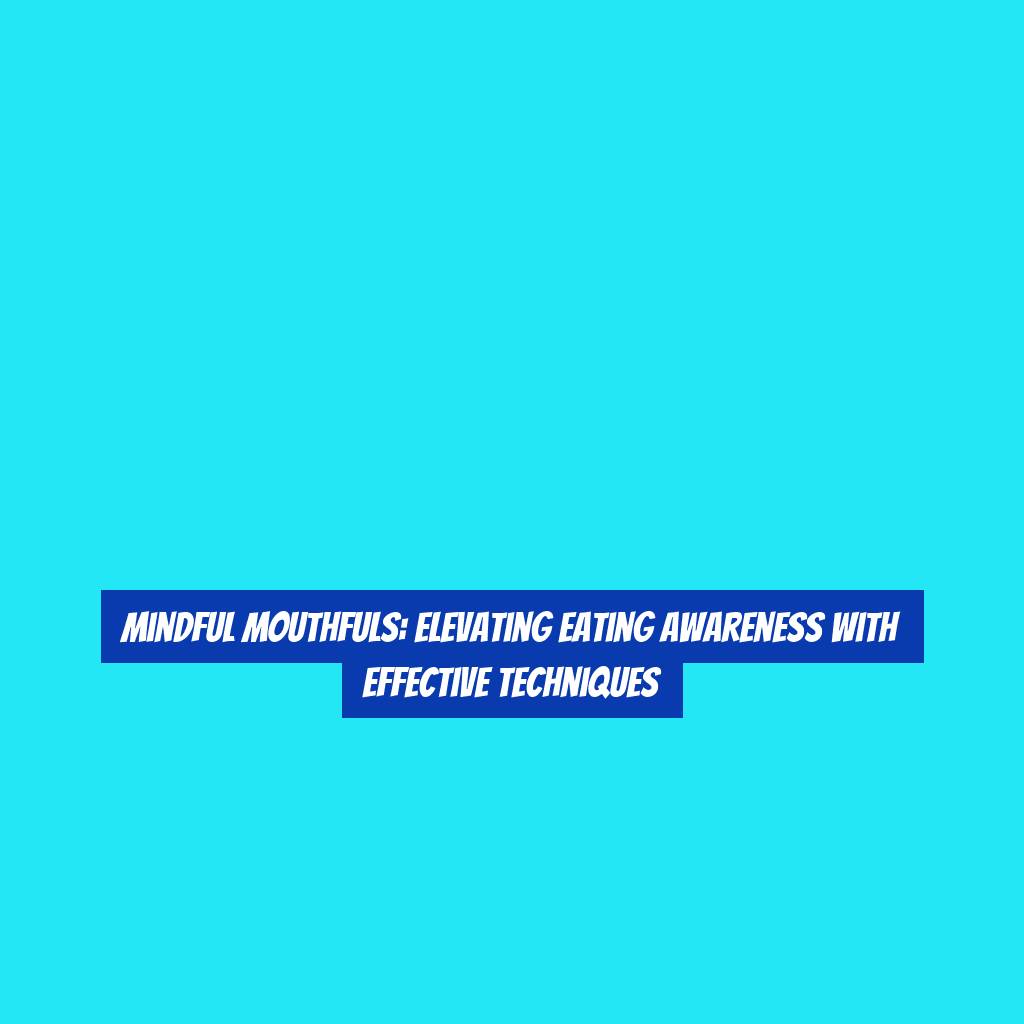Mindful Mouthfuls: Elevating Eating Awareness with Effective Techniques
Do you ever find yourself mindlessly devouring a meal without truly savoring its flavors or appreciating the nourishment it provides? The simple act of eating can be transformed into a deeply fulfilling and enriching experience through the practice of mindful eating.
By honing your awareness and employing effective techniques, you can elevate your eating habits to new heights. This shift in perspective has the potential to not only enhance your overall well-being but also foster a profound connection with the food you consume.
Whether youG??re seeking to cultivate a healthier relationship with food or simply yearn for a more fulfilling dining experience, exploring the principles of mindful mouthfuls may offer valuable insights that resonate with you.
Understanding Mindful Eating
Understanding mindful eating can lead to a healthier relationship with food and an improved sense of well-being. By being fully present and engaged in the act of eating, you can gain a deeper appreciation for the food you consume. Instead of rushing through meals, take the time to savor each bite. Pay attention to the flavors, textures, and sensations of the food in your mouth. This heightened awareness can help you recognize when youG??re full, preventing overeating.
Mindful eating also involves being attuned to your bodyG??s hunger and fullness cues. ItG??s about listening to your body and eating when youG??re truly hungry, not out of boredom or emotions. This awareness can prevent unnecessary snacking and promote a more balanced approach to eating.
Furthermore, mindful eating encourages you to consider the origins of your food and the effort that went into producing it. By acknowledging the journey of your meal from farm to table, you can develop a greater respect for the nourishment it provides. This awareness may also lead to more conscious food choices, supporting sustainable and ethical food practices.
Cultivating Eating Awareness
To cultivate eating awareness, practice bringing your full attention to the act of eating and the experience of consuming food. This involves engaging all your senses and being fully present in the moment as you eat.
Here are some effective techniques for cultivating eating awareness:
-
Mindful Eating Exercises: Incorporate mindful eating exercises into your routine, such as focusing on the taste, texture, and aroma of each bite. This can help you develop a deeper appreciation for your food and the act of eating.
-
Eliminate Distractions: Create a conducive environment for mindful eating by eliminating distractions such as electronic devices, television, or reading materials. By removing these distractions, you can direct your full attention to the sensory experience of eating.
-
Chew Thoroughly: Take the time to chew your food thoroughly and savor the flavors. This not only aids in digestion but also allows you to fully experience the taste and texture of each mouthful.
-
Practice Gratitude: Before starting your meal, take a moment to express gratitude for the nourishment youG??re about to receive. Cultivating a sense of gratitude can enhance your eating awareness and promote a more mindful approach to food consumption.
Techniques for Mindful Dining
As you consider techniques for mindful dining, continue to hone your ability to bring full attention to the act of eating and the experience of consuming food, building on the cultivation of eating awareness.
One effective technique is to start your meal with a moment of gratitude. Take a few deep breaths and reflect on the effort and resources that went into producing the food in front of you. This helps to ground you in the present moment and fosters a sense of appreciation for the nourishment youG??re about to receive.
Another useful technique is to eat without distractions. Turn off the television, put away your phone, and focus solely on the act of eating. This allows you to savor the flavors, textures, and aromas of your food, and also enhances your awareness of hunger and fullness cues.
Chewing your food slowly and thoroughly is a simple yet powerful technique for mindful dining. This not only aids in digestion but also gives you the opportunity to fully experience the taste and consistency of each mouthful.
Benefits of Conscious Eating
Practicing conscious eating encourages a heightened sense of appreciation for the nourishment and sustenance your food provides. By being mindful of what and how you eat, you can derive numerous benefits that positively impact your overall well-being.
-
Improved Digestion: Paying attention to your food allows for better chewing, which aids in digestion and nutrient absorption.
-
Enhanced Enjoyment: Engaging all your senses while eating can lead to a greater enjoyment of the flavors, textures, and aromas of your meals.
-
Better Food Choices: Conscious eating promotes awareness of your bodyG??s hunger and fullness cues, helping you make healthier food choices and avoid overeating.
-
Mind-Body Connection: It fosters a stronger connection between your mind and body, promoting a more balanced and harmonious relationship with food.
These benefits underscore the importance of being present and mindful during meal times. By being more conscious of your eating habits, you can savor your food, make healthier choices, and nourish your body and mind in a more fulfilling way.
Incorporating Mindful Eating Into Daily Life
Incorporating mindful eating into your daily life can further enhance the benefits of conscious eating, allowing you to cultivate a more mindful and nourishing relationship with food.
One effective way to incorporate mindful eating into your daily routine is by setting aside dedicated time for meals without distractions. This means turning off the TV, putting away your phone, and focusing solely on the act of eating. Pay attention to the flavors, textures, and aromas of your food, and take the time to savor each bite.
Additionally, practicing gratitude before meals can help center your mind and create a positive eating environment. Before you start eating, take a moment to express gratitude for the nourishment and energy the food will provide.
Another helpful technique is to listen to your bodyG??s hunger and fullness cues. Eat when youG??re truly hungry and stop when you feel satisfied, rather than relying on external cues or finishing everything on your plate out of habit.
Conclusion
So, next time you sit down for a meal, remember to slow down, savor each bite, and truly appreciate the nourishment youG??re providing your body.
By incorporating mindful eating into your daily routine, you can experience improved digestion, reduced stress, and a greater connection to your food.
Practice these techniques consistently and watch as your relationship with food and your overall well-being transform for the better.


